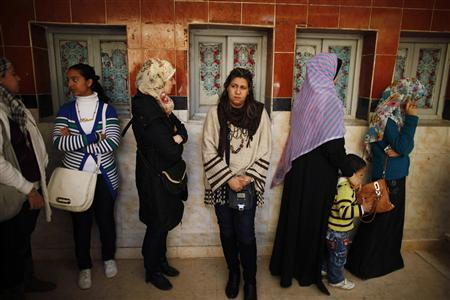Egypt Constitution Passes Despite Vote Fraud Claims

Egypt’s secular opposition charged fraud in the constitution referendum Sunday, but admitted that the charter pushed by Islamists has been approved.
The Muslim Brotherhood, which propelled President Mohamed Morsi to power in a June election, said an unofficial tally showed 64 percent of voters backed the charter after two rounds of voting that ended with a final ballot on Saturday. But it admitted that only a third of voters turned out.
An opposition official also told Reuters their unofficial count showed passage, but party spokesmen said there had been a series of abuses during the voting.
The main opposition coalition, the National Salvation Front, responded to the defeat by saying it was moving toward forming a single political party to challenge the Islamists who have come to dominate the new Egypt. It also said the result had been secured by "fraud, violations and organizational shortcomings."
"The referendum is not the end game. It is only a battle in this long struggle for the future of Egypt," it said. "We will not allow a change to the identity of Egypt or the return of the age of tyranny."
There were no big demonstrations after the results were announced, however, the Associated Press reported.
The Brotherhood’s Freedom and Justice Party, said, according to the Guardian, "We hope approving the new constitution would be an historic opportunity to reunite national forces, on the basis of mutual respect and sincere dialogue, in order to achieve stability in this homeland and to complete its constitutional institutions.”
The opposition noted a sharp disparity in the results between the first and second round. In the first round Dec. 15, which covered 10 governorates including the capital, Cairo, 54 percent voted yes. This ballooned in the second round to 72 percent.
Opposition activists alleged there had been such violations as inadequate judicial supervision of ballot boxes and attempts by staff to influence voters.
The referendum committee may not declare official results for the two rounds until Monday, after hearing appeals. If the outcome is confirmed, a parliamentary election will follow in about two months.
Morsi's Islamist backers say the constitution is vital for the transition to democracy, nearly two years after dictator Hosni Mubarak was overthrown. It also will provide the stability needed to help a fragile economy, they say.
The opposition accuses Morsi of pushing through a text that favors Islamists and ignores the rights of Christians, who make up about 10 percent of the population, as well as women. They say it is a recipe for further unrest.
The opposition said voting in both rounds was marred by abuses but it admitted the overall vote favored the charter.
"The majority is not big and the minority is not small," liberal politician Amr Hamzawy said, adding that the National Salvation Front would use "all peaceful, democratic means" such as protests to challenge the constitution.
“If we accept the legitimacy of working within the system, they have to agree that the opposition is legitimate,” Amr Moussa told The New York Times. The former Mubarak foreign minister, Arab League chief and presidential candidate has re-emerged as an opposition leader during the constitutional debate. “The ancien régime is finished. They are imagining things. They are imagining that if you say no to the constitution, as I have done, then you are part of a conspiracy to topple them.”
The vote was split over two days as many judges had refused to supervise the ballot, making a single day of voting impossible.
During the build-up to the vote there were deadly protests, sparked by Morsi's decision to award himself extra powers in a Nov. 22 decree and then to rush the constitutional vote.
The new basic law sets a limit of two four-year presidential terms. It says the principles of Shariah, Islamic law, remain the main source of legislation but adds an article to explain this. It also says Islamic authorities will be consulted on Shariah - a source of concern to Christians and others.
Rights groups reported what they said were illegalities in voting procedures. They said some polling stations opened late, that Islamists illegally campaigned at some polling places, and complained of irregularities in voter registration.
But the committee overseeing the two-stage vote said its investigations showed no major irregularities in the first round voting on Dec. 15, which covered about half of Egypt's 51 million voters.
“For voting for a founding document like a constitution, a low turnout is a major problem because it shows that there isn’t a broad public buy-in,” Shadi Hamid, director of research at the Brookings Doha Center in Qatar, told Bloomberg Businessweek. While the Brotherhood “can now claim more of a mandate,” the turnout “undermines the final results to some extent,” he said.
© Copyright IBTimes 2024. All rights reserved.





















